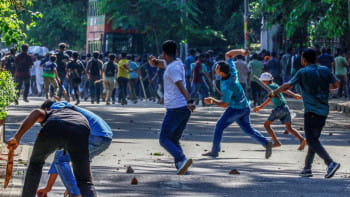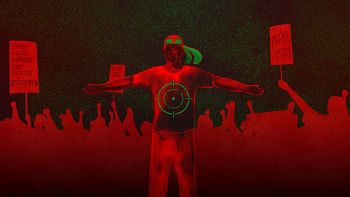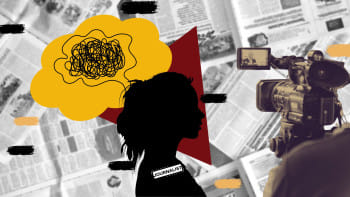The psychological costs of an uprising

In July, a friend told me about a student protester whose anxieties had become so severe, they wanted to be captured by the police just for the ordeal to be over with. The anguish expressed in such a desire is just a snapshot of the horrors experienced by individuals who saw a state turn against them in one of the most harrowing times in the country's recent history.
Nawshin, a student of Dhaka University, remains traumatised, "I saw the police firing with my own eyes, and I saw the kids fighting back with bricks and sticks." She found herself having a panic attack multiple times, an occurrence that is not typical for her.
The fact that she lives alone, away from her family in Dinajpur, made her situation worse. "I felt like I was living in a prison," she said. Without much cash, bKash inactive, and limited messages owing to a small phone balance, her woes were exacerbated by the tightened claws of a state machinery grasping for power by any and all means. We know, but we forget to mention, the case of many such students who were away from family at that time. Have they been able to find, in a new city they might have begun to call home, even a sliver of the peace they previously found there? Is it possible now to return to dormitories that saw raids, arrests, and the violations of privacies—including by the unlawful checking of phones? Can peaceful sleep come, even months after, when the walls of one's room stopped being a protected place?
The disruption of one's intimate space violated in this manner has been one of the most defining moments of the entire period of uncertainty we lurched into; the violence outside was another. However, the period after August 5, has its own issues. Raian Abedin, a student of North South University who partook in the protests, said, "I just cannot come to terms with a reality that shifted this violently and quickly. I know so many who suffered deep, deep wounds from the protests. While I myself was fortunate enough to not face the worst, the smell of tear gas, and the fear of death still comes back to me like a memory. What we are doing now is forcing normalcy, because we have to keep living no matter what."
Presenting a "normal" face to society is a struggle many face even in peaceful times. In the aftermath of an emergency, this issue becomes intensely complicated. It is after all, an event of massive proportions that shot its roots through every household. Zareena (name changed for privacy), a mother of two sons, who participated in the uprising, shared, "Because of the surroundings I am in and the upper-class society we mingle in, the people I usually mix with were not too invested in the situation. I felt I could not fully express my feelings."
While parents such as Zareena have been supportive, many friends and family may unwittingly be insensitive to those suffering from the memories of July. Dr Mehtab Khanam, an honorary professor in the Department of Psychology at Dhaka University, and a practicing psychologist, discussed how harmful making comparisons can be, and stated, "A lot of hurtful and judgmental comments are often passed wherein a person who is struggling might be asked why they are unable to manage when someone else in the same situation has."
This idea that one must recover because another has done so is deeply troubling. It has the effect of inflicting even more suffering on those already grieving. It is an issue afflicting not just the young, but parents like Zareena who feels she was unable to do much in her neighbourhood. Seeing the children on the streets as akin to her own children, she stated, "I have survivor's guilt that I was alive when they were out on the streets risking their lives."
For many, the return to one's previous life has been made difficult by reminders of the violence that occurred in the places they regularly pass through. For Nawshin, the Dhaka University campus bore remnants of the violence, not just in her memory, but also in the graffiti memorialising the martyred. She said, "Each time I go to campus, I am reminded of the blood. Each time I enter, I feel like I am once again traumatising myself."
However, violence has not become just a memory after August 5. It has remained an active threat for many. Nawshin stated that she never needed to think about what she wears, but now, it is a fear she carries.
Raian stated, "The protests were not the end of the story. If anything, they gave rise to numerous new things to worry about." Recently, there have been accounts of mob lynchings and increased attacks on women, but also in the retaliatory acts of violence against family members of the Awami League and the increased threats posed against systemically vulnerable communities. Even protesters themselves are finding themselves in uncertain situations. Musharrat Hossain, senior lecturer at North South University, stated, "In the aftermath, we are seeing that many students at the frontlines of the uprising are now being sidelined. At all campuses, vested groups seem to be awaiting their chance to take their stakes from the movement. In many cases, those who had put their lives on the line are not getting their due recognition."
At present, even identifying the underlying issues poses challenges. For one, not enough time has passed for us to know if people have post-traumatic stress disorder. Moreover, the symptoms of distress and various stress disorders are numerous, ranging from disrupted sleep and changes in appetite to a loss of ability to function or control one's moods. Making the situation worse is the lack of understanding that the majority of the population has towards mental health issues. Dr Mehtab Khanam stated, "There remains a lot of stigma about mental health. A majority of the nation's citizens are unaware of matters regarding mental health." Locating the problem to one of the fundamental aspects of modern society, she states, "It is unfortunate that we have been unable to develop an education system that is able to make all aspects of a child flourish." She mentioned the lack of attention to vital life skills, whether communication, anger management or problem-solving, that remain untaught in our educational institutions.
In a similar vein, Musharrat Hossain said, "The reality is we have to help the students heal. Teachers have been altering their syllabi to accommodate student's needs after such a violent period. In truth, however, we have failed to truly help them heal. Trauma-informed teaching is something we are unable to do in our universities at this point."
The systemic issues, along with the more vicious cultural stereotypes surrounding mental health, make even the admission of one's struggles a minefield. Pair this with the mushrooming of individuals claiming to have solutions for those already in a vulnerable condition, and you have a recipe for the exploitation of people with mental health struggles. I asked Dr Mehtab Khanam how an individual can know for certain that the professional they are seeking help from is a legitimate entity, and she replied, "There is currently no way to know." The answer is distressing, but Khanam explains, "At present, while there is a licensing body for psychiatrists, no such body exists for psychologists. Further exacerbating the situation is the existence of very short courses that require only a small amount of training. For a psychotherapist and a psychologist, it is not only hours of training that are required, but application of knowledge and also personal sessions for the therapists themselves."
For people battling mental illnesses for a long time, the problems are far too intimately known. Many see the answer in individual efforts, but the fact might be that just as the uprising took thousands, this challenge too will take thousands to solve. In the case of Bangladesh, it would be millions. Musharrat Hossain lays the responsibility on institutions. She said, "There is no such thing as people's reform. It must happen at a policy level, and the current period is crucial for us to act in order to prevent the vulnerable from being further abused and marginalised."
What we do know however, is that in some ways, a cultural shift has occurred post-July, if not at a mass scale, then at least among many individuals who had previously not been as concerned about the state of affairs in the country. When asked if the uprising made her more protective of her children, Zareena said, "No, the courage has increased. If the need arises, I would expect my children to stand for what is right. Unless I am satisfied that the sacrifice of all those we lost was successful, I will remain concerned about the current situation of Bangladesh."
Aliza Rahman is a member of the editorial team at The Daily Star.
Follow The Daily Star Opinion on Facebook for the latest opinions, commentaries and analyses by experts and professionals. To contribute your article or letter to The Daily Star Opinion, see our guidelines for submission.

 For all latest news, follow The Daily Star's Google News channel.
For all latest news, follow The Daily Star's Google News channel. 









Comments